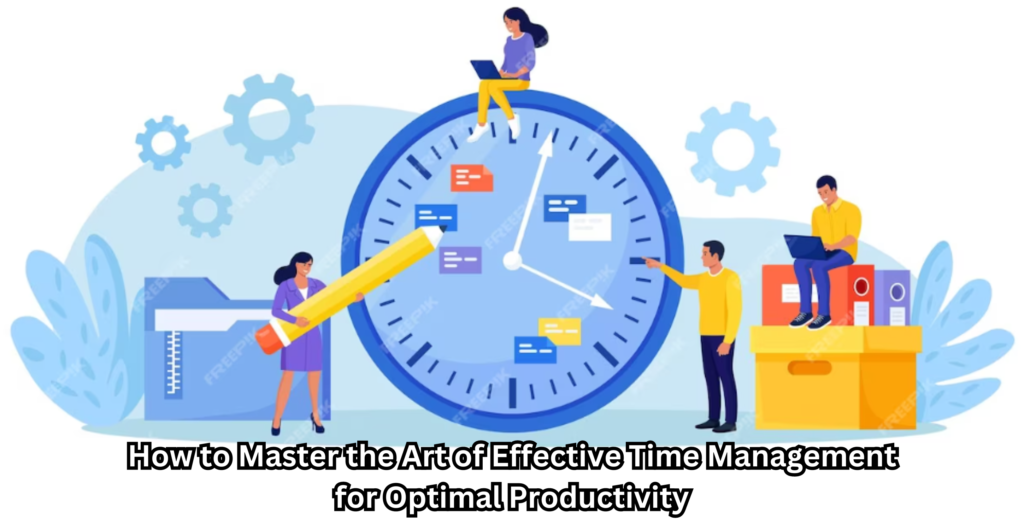Hey there! Let’s talk about mastering your time. Sounds like a superhero skill, right? Well, it is. Effective time management is about making the most of your day, feeling accomplished, and still having time for a Netflix episode. So, buckle up, and let’s learn how to become a time-management ninja!

Understanding Effective Time Management
Imagine having an extra hour every day. What would you do with it? Effective time management can make you feel like you’ve found a hidden time stash. It’s not just about being busy but being productive in what matters. It’s the difference between running on a treadmill and running towards a finish line – you want to do the latter.
Common Time Management Pitfalls
We’ve all been there – scrolling through social media, saying ‘yes’ to every request, or tackling tasks with no real plan. These habits eat into our productivity, like termites in a wooden house. Identifying these time-wasters is your first step to a more productive life.
Strategies for Effective Time Management

Setting Clear Goals
The Role of SMART Goals: Picture your goal as a destination on a map. SMART goals are like your GPS, guiding you there. Be Specific about what you want to achieve. Make it Measurable so you know when you’ve reached it. Ensure it’s Achievable; it’s good to dream big but be realistic. It should be Relevant to your larger life goals. And finally, Time-bound – set a deadline.
Prioritizing Your Goals: Have you ever heard of the saying, “Major in the majors and minor in the minors”? That’s what prioritizing is all about. It’s deciding what’s a major (urgent and important) and a minor (less critical and less important). Tools like the Eisenhower Matrix can be super handy here.
Planning and Organizing
Creating a Daily Schedule: Having a plan is like having a road map for your day. Start each morning (or the night before) by jotting down your tasks. Estimate how long each will take and schedule them. Don’t forget to include breaks – your brain will thank you.
The Power of Routines: Routines are like the rhythm of a drumbeat; they keep you moving in a steady flow. Morning routines can include meditation, exercise, or reading. Evening routines involve planning for the next day or a winding-down ritual. Routines help reduce decision fatigue and keep you on track.

Time Management Techniques
The Pomodoro Technique: This technique is like interval training for your brain. You work for 25 minutes, then take a 5-minute break. It keeps your mind fresh and prevents burnout. Plus, racing against the clock can be a fun challenge!
Time Blocking: Think of your day as a series of blocks dedicated to a specific task. This is great for deep work and helps prevent multitasking, which, believe it or not, is pretty inefficient.
Overcoming Procrastination
Identifying the Causes: Procrastination is like a sneaky bug – you need to understand why it’s there to get rid of it. Is it fear, lack of interest, or feeling overwhelmed? Once you know the cause, you can tackle it head-on.
Practical Tips to Beat Procrastination: Set tiny goals for big tasks – it’s less daunting. Create an environment that encourages work – a tidy desk and mind, right? And give yourself a pep talk if you need to – sometimes, you must be your cheerleader.
Balancing Work and Life
The Importance of Downtime: All work and no play makes you dull and can lead to burnout. Your brain needs rest just like your body does after a workout. Downtime is not wasted time; it’s essential for long-term productivity.
Strategies for Work-Life Balance: Draw a line between work and home life, even if you work from home. Set specific work hours, and shut the office door (physically or metaphorically) when it’s family or me-time. And remember, it’s okay to say no to requests that don’t fit your priorities.

Final words
There you have it – a deep dive into mastering effective time management. It’s about setting goals, planning, using nifty techniques, and balancing work and life. It might seem overwhelming at first, but take it step by step. Soon, you’ll be managing your time like a pro, and who knows, you might find that extra hour in your day for something fun!
Frequently Asked Questions (Faqs)
What Are the Best Strategies for Effective Time Management?
Answer: The best strategies for effective time management include setting clear and achievable goals, prioritizing tasks, using time management techniques like the Pomodoro Technique and time blocking, and planning your day. Incorporating regular breaks and maintaining a balance between work and personal life are also crucial for sustainable productivity.
How Can I Improve My Daily Productivity Through Time Management?
Answer: To improve productivity, create a structured daily schedule that allocates specific task time blocks. Prioritize your tasks based on urgency and importance. Utilize techniques like the Eisenhower Matrix for prioritization and the Pomodoro Technique for maintaining focus. Regularly review and adjust your schedule to find what works best for you.
What Is the Pomodoro Technique and How Does It Help in Time Management?
Answer: The Pomodoro Technique is a time management method that involves breaking your work into 25-minute focused intervals (called Pomodoros) followed by a 5-minute break. This technique helps maintain high levels of focus and productivity while preventing burnout. It’s particularly effective for tasks that require sustained concentration.
Can Effective Time Management Help Reduce Stress?
Answer: Absolutely! Effective time management can reduce stress by preventing last-minute rushes and workload pile-ups. By organizing tasks and managing your time efficiently, you can create a more balanced and less hectic schedule, allowing for better work-life balance and reduced feeling overwhelmed.
What Are Some Common Time Management Mistakes to Avoid?
Answer: Common time management mistakes include failing to set clear goals, not prioritizing tasks effectively, succumbing to distractions, multitasking excessively, and not taking breaks. Avoiding these pitfalls is key to managing your time effectively. Also, be wary of overcommitting and learn to say no to tasks that don’t align with your priorities.

🚀 Boost Your Productivity!
Join our weekly newsletter for top time management tips and productivity strategies. Subscribe now to get the latest insights and a special bonus guide: “10 Effective Time Management Techniques.





